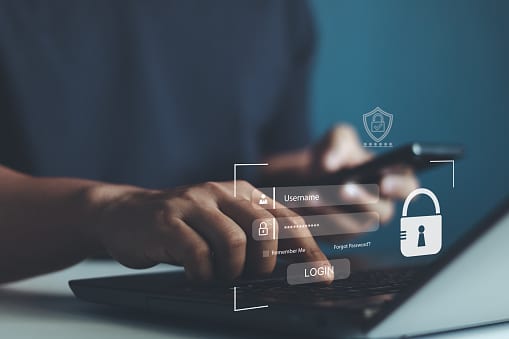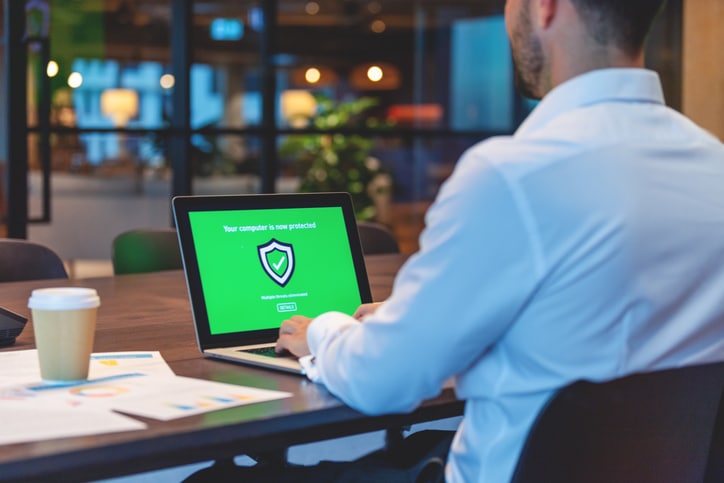Cybersecurity Tips for Small Business Owners
October 18, 2024 Category: Business Services
As a small business owner in Ontario, you’ve probably heard a lot about cybersecurity in recent years. It’s a topic that might seem overwhelming or even something that only large corporations need to worry about. However, the reality is that small businesses are increasingly being targeted by cybercriminals because they often have fewer resources to dedicate to security.
October is both Small Business Month and Cybersecurity Awareness Month, making it the perfect time to ensure your business is protected from digital threats. Here are some practical, easy-to-implement tips that can help you safeguard your business.

- Use Strong Passwords and Two-Factor Authentication (2FA)
One of the simplest yet most effective ways to protect your business is by using strong, unique passwords for every account. Passwords should be at least 12 characters long and include a combination of letters, numbers, and symbols. Consider using a password manager to keep track of them.
Why it matters: Weak passwords are one of the easiest ways for hackers to gain access to your business accounts. Two-factor authentication (2FA) adds an extra layer of security by requiring a second form of verification, such as a code sent to your phone, when logging into sensitive accounts.
A 2019 report from Microsoft found that 2FA can block 99.9% of automated attacks, while Google reports that SMS-based 2FA can prevent 100% of automated attacks, 96% of bulk phishing attempts, and 75% of targeted attacks. Using 2FA significantly reduces the likelihood of unauthorized access, ensuring that even if passwords are compromised, your accounts stay protected.

- Educate Your Employees on Cybersecurity
Cybersecurity isn’t just an IT issue—it’s a team effort. Your employees are often the first line of defense against cyber threats. Regular training on how to spot phishing emails, suspicious links, and other common tactics used by cybercriminals is essential.
Why it matters: Even the best security systems can fail if your team unknowingly clicks on a phishing email or downloads malicious software. Educating your employees reduces the risk of human error leading to a security breach.
In fact, 82% of data breaches involve a human element, often due to employees falling victim to phishing attacks or other forms of social engineering. Training your employees can lead to a 70% reduction in security-related risks, emphasizing the value of proactive security awareness programs.

- Keep Your Software Up-to-Date
Software updates aren’t just about adding new features; they’re also about fixing security vulnerabilities. Ensure that your business’s operating systems, antivirus software, and any other applications you use are always up to date.
Why it matters: Cybercriminals often exploit weaknesses in outdated software. By keeping everything updated, you minimize the risk of someone exploiting these gaps to access your data.
In 2023, 35% of malware was delivered via email, often through vulnerabilities in outdated systems. Keeping software updated ensures that these known vulnerabilities are patched, reducing your exposure to cyber threats.

- Backup Your Data Regularly
Regular data backups are crucial for protecting your business in case of a ransomware attack or system failure. Back up important files daily, and make sure these backups are stored securely, either in the cloud or on a separate physical drive that isn’t connected to your main network.
Why it matters: If your system is compromised, having a recent backup means you can restore your data without paying a ransom or losing important business information. It’s an inexpensive insurance policy that every business should have in place.
The average cost of a ransomware attack in 2024 is $4.91 million, but with secure backups, you can avoid paying ransoms and quickly recover lost data, minimizing operational disruption.

- Secure Your Wi-Fi Network
Many small businesses don’t think twice about their Wi-Fi security, but an unsecured network can be an easy entry point for cybercriminals. Make sure your network is password-protected, and consider setting up a separate network for guests or clients to use, so it doesn’t interfere with your business operations.
Why it matters: Unsecured networks make it easy for hackers to eavesdrop on your business activities or even steal sensitive data. By securing your Wi-Fi, you add another layer of protection to your operations.
Distributed Denial of Service (DDoS) attacks, which can overwhelm networks and make them inaccessible to legitimate users, are becoming more frequent. Microsoft reports that it mitigates 1,700 DDoS attacks daily, highlighting the importance of having a secure network in place.

- Install Firewalls and Antivirus Software
Firewalls act as a barrier between your business’s network and potential threats from the outside world. Antivirus software helps detect and remove malicious software that could harm your systems.
Why it matters: These tools are essential for keeping your network safe from outside attacks. Firewalls and antivirus software act as gatekeepers, monitoring your network for suspicious activity and blocking harmful intrusions before they can cause damage.
With ransomware attacks rising by 74% between 2022 and 2023, having proper antivirus protection and firewalls in place is critical to preventing these increasingly common threats from infiltrating your business.

- Develop a Cybersecurity Plan
Every business, no matter how small, should have a cybersecurity plan in place. This plan should outline your security protocols, data backup procedures, and a response plan in case of a breach. Having a plan ensures that you and your team know what to do if something goes wrong.
Why it matters: Without a clear plan, a cyberattack can turn into a much larger problem. Knowing what steps to take in the event of a breach will help your business recover more quickly and with less damage.
Data breaches cost an average of $4.88 million globally in 2024. A well-prepared cybersecurity plan can significantly reduce these costs by ensuring that your team responds quickly and effectively, minimizing downtime and damage.
Why Cybersecurity Matters for Ontario’s Small Businesses
Small businesses in Ontario are the backbone of local communities, but they often underestimate the importance of cybersecurity. With more operations moving online and sensitive data being stored digitally, the risks are higher than ever. Cyberattacks can lead to lost revenue, damaged reputation, and even legal liabilities.
By implementing these cybersecurity tips, you can protect your business, your customers, and your reputation. The good news is that you don’t need to invest in expensive, complex systems. Many of these tips are low-cost and easy to apply, making them accessible to businesses of all sizes.
Stay Proactive, Stay Safe
As a small business owner, protecting your business from cyber threats doesn’t have to be complicated. By following these tips and ensuring your systems are secure, you take important steps toward safeguarding your business. However, it’s also important to work with a trusted telecom provider that keeps cybersecurity at the forefront of their services.
A reputable telecom partner will offer more than just internet and phone services; they’ll also provide built-in security features, such as secure networks, encrypted communications, and reliable backups, helping you protect your business without the need for additional layers of complexity. Partnering with a provider who understands the unique challenges small businesses face can give you peace of mind, knowing that your business’s data and communication are secure.
Take Action Today!
Don’t wait until it’s too late. Protect your business with these essential cybersecurity tips and partner with a telecom provider that prioritizes your security. Contact Execulink today to learn how our business solutions can keep your data safe and your operations running smoothly.
Stay secure. Stay connected. Stay ahead.




